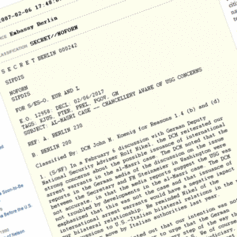
We’re still reviewing the most recent mass of Wikileaks documents, but already they reveal improper government conduct: responsible for the kidnapping, extraordinary rendition and torture of German national Khaled El-Masri, an ACLU client. Mr. El-Masri was kidnapped from Macedonia in 2003, taken to a secret CIA-run prison in Afghanistan where he was held for several months and tortured before being released on a hillside in Albania.
In 2007, even as the ACLU was asking a federal court to find that former CIA director George Tenet violated U.S. and international human rights laws when he authorized agents to abduct and abuse Mr. El-Masri, a Wikileaks-released diplomatic cable describes a U.S. official’s efforts to prevent international accountability. According to , which is from the U.S. Embassy in Berlin, Chargé d'Affaires John M. Koenig told German officials to “weigh carefully at every step of the way the implications for relations with the U.S.” of issuing international arrest warrants in the El-Masri case.
In the end, the lower courts in the United States refused to hear Mr. El-Masri’s case on the grounds that it concerned state secrets, the Supreme Court declined the ACLU’s appeal on Mr. El-Masri’s behalf, no German prosecution of CIA officials has yet taken place, and Mr. El-Masri, an acknowledged innocent, has never received an official apology, let alone compensation for the abuses he suffered.
Much of the furor over the Wikileaks document release has not focused, however, on government wrongdoing and efforts to shield it from judicial and public view. And indeed, it is this larger point that is lost when the emphasis is on diplomats with egg on their faces because of unvarnished, often gossipy, assessments of world leaders.
The Wikileaks phenomenon — the existence of an organization devoted to obtaining and publicly releasing large troves of information the U.S. government would prefer to keep secret — illustrates just how broken our secrecy classification system is. While the Obama administration has made some modest improvements to the rules governing classification of government information, both it and the Bush administration have overclassified and kept secret information that should be subject to public scrutiny and debate. As a result, the American public has had to depend on leaks to the news media and whistleblowers to know what the government is up to.
Without whistleblowers who disclosed illegal activity, we wouldn’t know about the CIA’s secret prisons and we wouldn’t know about the National Security Agency’s warrantless wiretapping program. Without leaks to the media, we wouldn’t know that civilian casualties from the war in Iraq are much higher than was thought, or that U.S. troops were going into battle without adequate body armor.
There is certainly a narrow category of information that the government should be able to keep secret in order to protect national security and for other purposes. But the reality is that much more information has been classified by the U.S. government than should be, and information is often classified not for legitimate security reasons, but for political reasons — to protect the government from embarrassment, to manipulate public opinion or even to conceal evidence of criminal activity. When too much information is classified, it becomes more and more difficult to separate the information that should be made public from the information that is legitimately classified.
What the Wikileaks phenomenon means in the longer term — and how the government will respond — is still open to question. But two things are already clear. First, to reduce incentives for leaks, the government should provide safe avenues for government employees to report abuse, fraud and waste to the appropriate authorities and to Congress. Second, the Obama administration should recommit to the ideals the president invoked when he first came to office: “The government should not keep information confidential merely because public officials might be embarrassed by disclosure, because errors and failures might be revealed, or because of speculative or abstract fears.” Democracy, after all, depends on transparency. The American public has a right to know what the government is doing in its name.

